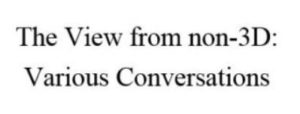
2013-04-25 John Peterson’s questions
I’ve been enjoying Sphere & Hologram and have a couple of questions for you (and your guys):
- If the plusses and minuses in this life/experience are essentially balanced and there is an increase in plusses (as in more people becoming “enlightened”), does that mean that there will be an attendant increase in minuses? As humanity evolves is there necessarily an equal and opposite polarity? Is that what we are seeing in the degeneration of our present system and values?
- If there is no good and bad in what is happening, what is the meaning and importance of compassion? Are we not to empathize with the pains of others?
April 25, 2013
Okay, guys, you can read as well as I can. Can you give us answers to John’s questions?
The better the question, the better the answer. Have you heard that anywhere?
Very funny. Okay, so—
Question one shows the distortion in perception systematically imposed by your living in three-dimensional time. Because you live in (or, we should say, under) the moving present, your lives as you experience them are in distorted perspective, with any given moment of time necessarily having an exaggerated importance.
Meaning, the “present” moment.
Of course. That is the only moment you can function in, and there’s nothing wrong with that, it’s in the design, but if you want to understand, you have to be able to remember that the distortion is there. So, in John Peterson’s first question, there is an underlying unnoticed assumption that plusses and minuses should balance at any given moment in time. But that’s not so.
Do you not have an expression “these are dark times”? Some times ARE darker than others; some times have a far greater concentration of minuses than plusses, especially some times in some places. Think of the Western Front in World War I. Think of the death camps of the 1930s and 1940s. Think of war zones, and killing fields, and think of the innumerable ways people may be oppressed not only in a given time but over years or generations. Think for instance of the American Indians from about the 1850s until your own day, and for some time “yet to come.” Now, we are not making a political statement here. We are saying that plusses and minuses do balance out in the overall system because they must – but that is not the same thing as saying that they must (or even could) balance out in each area and in each era.
You might even say that times of enlightenment and progress – such as the 19th century in many places – are paid for (or are payment of) times of brutality and regression elsewhere, elsewhen.
The assumption behind “as humanity evolves” is incorrect. Each civilization, each expression of a set of possibilities, has its own strengths and weaknesses, and each one is designed, or designs itself, to enable certain expressions and disadvantage or disable others. The whole idea of “universal progress” assumes a starting-point, a progression, and a goal. But that’s not what human life is about. That assumes (tacitly, unconsciously) that the physical universe is the important thing, whereas – at least from our view – the physical is only a special case of the larger reality. Therefore what happens in the physical is not quite as important to us, or let’s say, it isn’t quite as totally important to us, as it necessarily is to those temporarily immersed in it. We assure you, your total selves (which you can hear assenting to this even as you read it) know better.
Now, the second question – copy it and repeat it here – is interesting in a couple of respects.
“If there is no good and bad in what is happening, what is the meaning and importance of compassion? Are we not to empathize with the pains of others?”
In the first place, you have heard us say many times, compassion is always good. The impulse to help is always good. An open heart is always good. BUT – (and it’s a big “but”) – the world is not broken, nor if it were would you necessarily know how to fix it. Suffering has its uses, however uncomfortable it may make others to watch it. Pain of any kind may be someone’s wake-up call. You will remember (or anyway, Frank, you will remember, for you heard it repeatedly), we do know how it appears to you in material reality, but we cannot and do not see it that way. Pain is often so useful! Not to observers (though it may be to them, as well, if it opens their hearts) but to the person experiencing the pain.
This is not to say people need to be punished for something, or that they’re only suffering because they are unenlightened, and it is certainly not to say that these things happen by accident. Nothing happens by accident. It is to say that appearance always may deceive, and in material reality most of what you have to judge by is appearance. The only time you really know is when you know what you feel, for as has been rightly said, feelings are the language of the soul, and the soul (in this usage) is the part of you that sees from a non-physical as well as a physical perspective.
We hope this helps. Good questions.
It certainly helps me. Thanks for this clarification. For me, this links well to your post “Civilization and the Individual.”